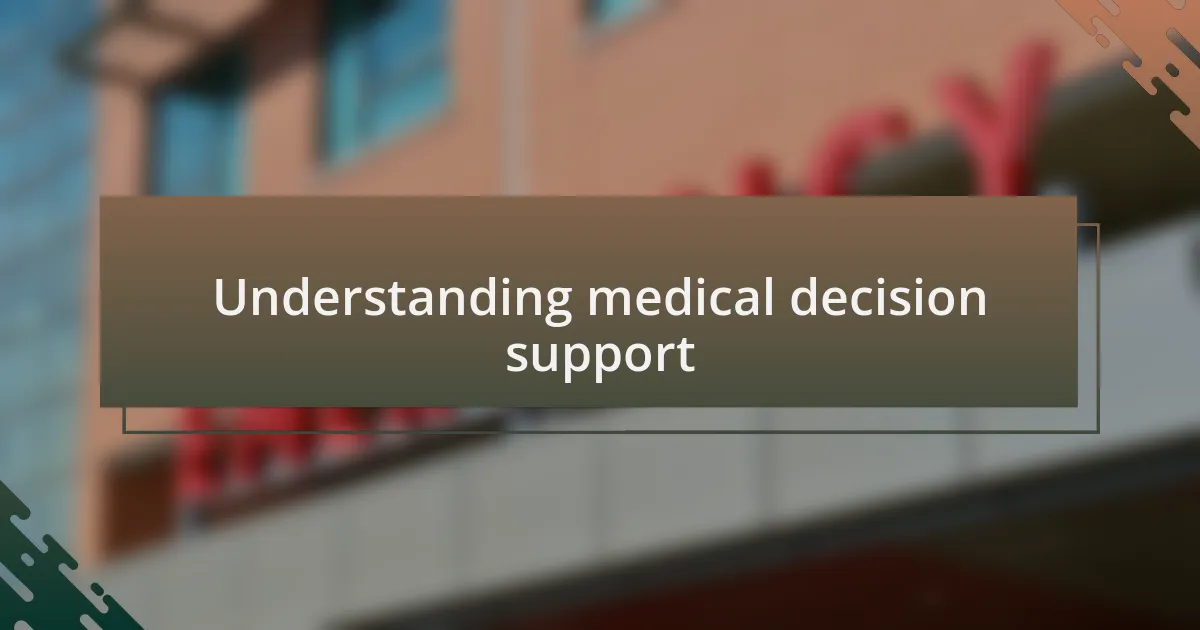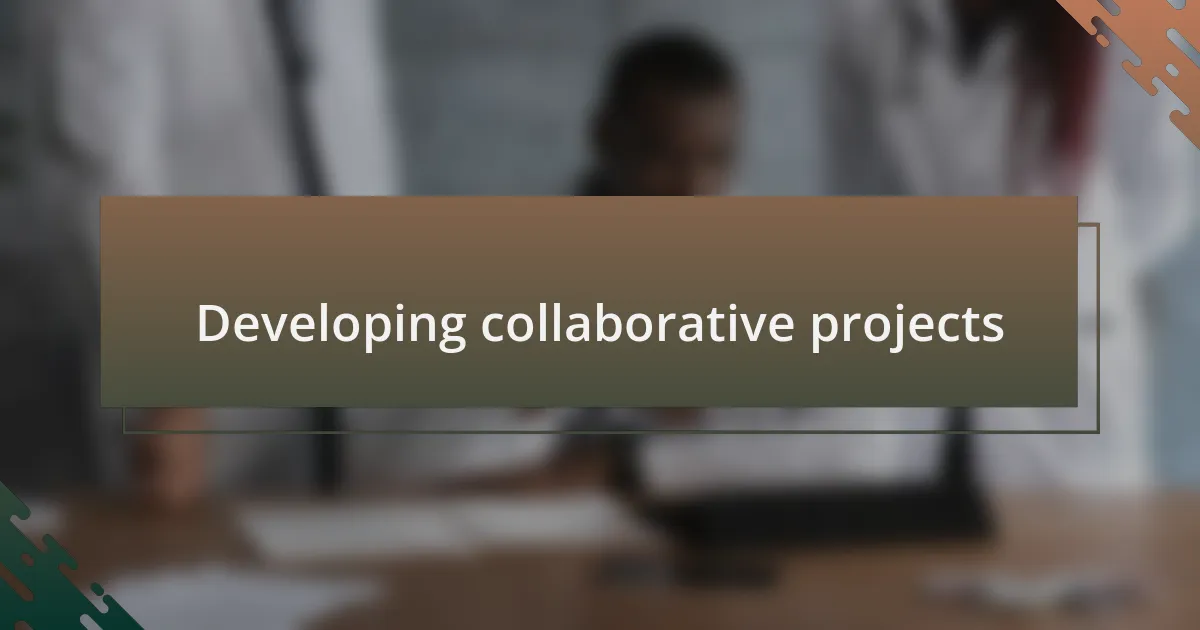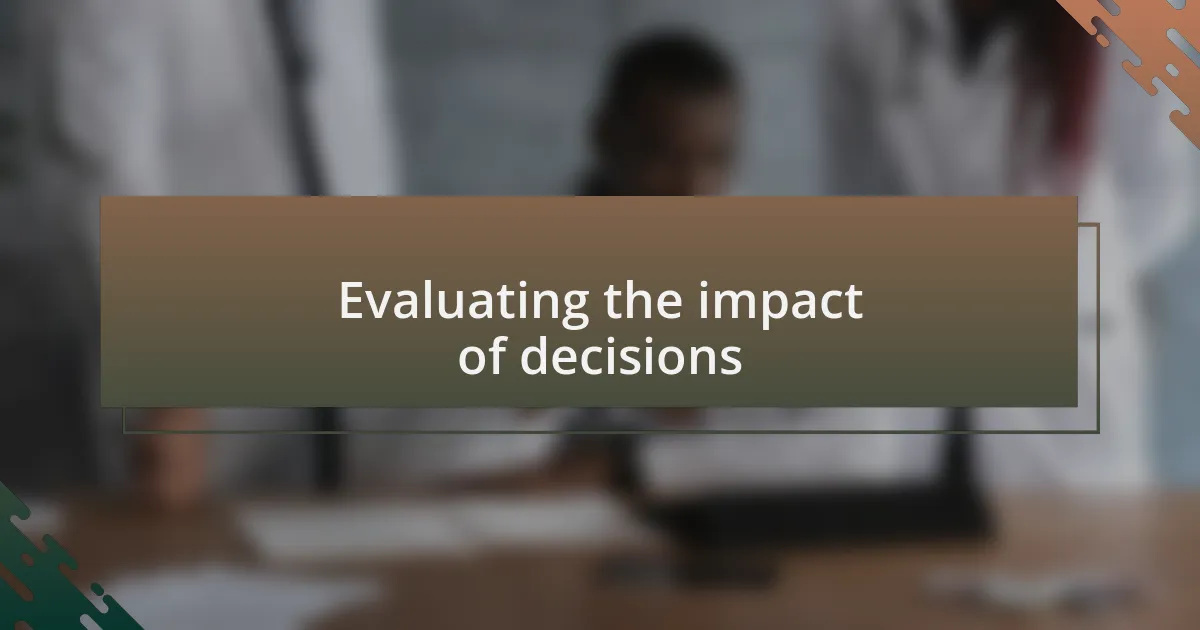Key takeaways:
- Medical decision support systems enhance patient care by synthesizing data into actionable insights, improving outcomes and reducing clinician anxiety.
- Research in healthcare is crucial for evidence-based practices and innovation, directly impacting patient treatment protocols and care quality.
- Effective time management and collaboration among researchers can enhance productivity, making complex projects more manageable and fostering innovative solutions.
- Evaluating the impact of decisions requires both quantitative metrics and qualitative feedback to ensure continuous improvement in healthcare practices.

Understanding medical decision support
Medical decision support is essentially the intersection of clinical expertise and technology, designed to enhance the quality of patient care. I often think about how, during my time working in healthcare, I witnessed firsthand how these systems can lead to more informed care decisions. Have you ever considered how a simple algorithm can change the trajectory of a patient’s recovery?
The effectiveness of medical decision support systems lies in their ability to synthesize vast amounts of data into actionable insights. I remember a specific case where a physician used a decision support tool that highlighted potential drug interactions; it not only improved the patient’s outcome but also relieved the physician’s anxiety about missing important clinical details. Isn’t it reassuring to know that we have the technology to safeguard our health decisions?
Integrating clinical knowledge with real-time data, medical decision support empowers healthcare providers to navigate complex cases more effectively. This brings to mind moments of urgency in the ER, where quick, insightful decisions can mean the difference between life and death. How often do we rely on a blend of personal experience and technology to make these crucial decisions?

Importance of research in healthcare
Research in healthcare is not just about gathering data; it’s about transforming that data into tangible benefits for patient care. When I reflect on past research studies I participated in, I can’t help but feel the excitement of being part of something that could change lives. Have you ever thought about how a single study can lead to better treatment protocols and improved patient outcomes?
In my experience, the importance of research is underscored by its role in underpinning evidence-based practice. For instance, I recall a time when we adapted a treatment guideline based on recent research findings, which ultimately led to a drastic reduction in post-operative complications. Isn’t it inspiring to think that every research discovery has the potential to save lives or improve the quality of care?
Moreover, research fosters innovation, pushing the boundaries of what is possible in medical treatment. I remember attending a conference where groundbreaking studies were presented on telemedicine and its efficacy during emergencies. It struck me then how research does not exist in a vacuum—it directly influences how we respond to crises. How crucial it is to stay updated with these advances in order to provide the best care possible!

Time management for researchers
Effective time management is essential for researchers navigating the demands of clinical studies and practical applications. I’ve often found myself juggling multiple projects, each requiring attention. One strategy that worked for me was creating a detailed schedule that allocated specific hours for research, writing, and even breaks. Have you ever noticed how much clearer your thinking is when you give yourself time to recharge?
Prioritizing tasks can seem daunting, but I’ve learned to break down larger projects into manageable segments. For example, while working on a systematic review, I set weekly goals for literature searches and data analysis. This approach kept me motivated and on track, making overwhelming tasks feel more achievable. Have you ever had that satisfying moment when a complex project comes together because you tackled it piece by piece?
Lastly, I’ve discovered that collaboration can greatly enhance time efficiency. Engaging with fellow researchers not only brings fresh perspectives but also helps distribute the workload. I still remember creating a shared timeline with colleagues for a grant proposal—it made the process smoother and more enjoyable. Have you experienced the unexpected synergy that comes from working as part of a team?

Developing collaborative projects
Collaborative projects are a treasure trove of opportunities if approached with the right mindset. I vividly recall a time when I joined forces with clinicians to develop a decision support tool. Our diverse backgrounds not only enriched the discussions but also sparked innovative ideas that I wouldn’t have considered alone. Have you ever felt that rush of creativity when brainstorming with others?
As I dove deeper into establishing partnerships, I realized communication was key. Regular meetings became our lifeline; they helped us align on goals and address any challenges. During one particular project, we hit a roadblock, but it was our open dialogue that uncovered alternative solutions. Have you ever faced a dilemma in a project that seemed insurmountable until the right conversation opened a new path?
One of the most rewarding aspects of collaboration, I’ve found, is the sense of shared ownership. Celebrating milestones with my team, like when we launched our pilot study, created a bond that motivated us to push through subsequent challenges. How often do we underestimate the power of camaraderie in driving project success?

Evaluating the impact of decisions
Evaluating the impact of decisions requires a systematic approach to measure outcomes against expectations. I remember a specific project where we implemented a new decision support system. Initially, we were hopeful, but it wasn’t until we analyzed patient outcomes that we realized the system didn’t significantly reduce the time to diagnosis as we had hoped. Has there been a time you thought a solution would be a game-changer, only to find it fell short?
Quantitative metrics, like reduced hospital stays or improved patient satisfaction scores, often tell part of the story, but qualitative feedback is equally valuable. During one evaluation, we conducted interviews with clinicians who used the tool, uncovering insights about workflow disruptions that numbers alone could not convey. Isn’t it fascinating how human experiences can provide depth that raw data sometimes misses?
Subsequent decisions should always factor in this evaluation process; it’s about learning and iterating for better outcomes. After assessing our initial launch, we convened a team meeting focused on feedback and brainstorming adaptations, leading to a revised version that better met user needs. Have you ever transformed a setback into a stepping stone for future success?